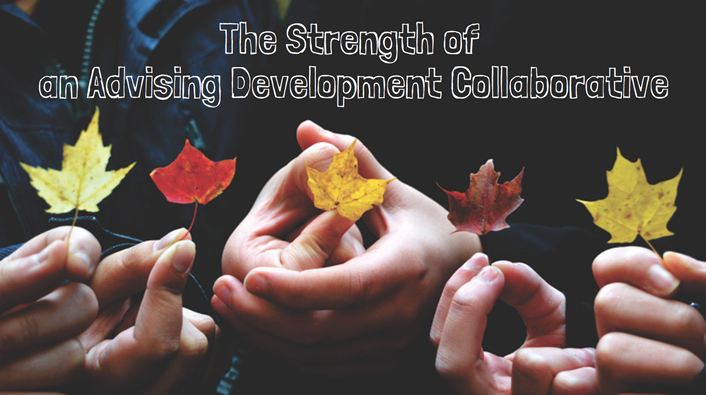
As the role academic advising plays within student success is growing, West Virginia University is working to provide a multitude of resources for advisors across all disciplines. Beginning in the fall 2016 semester, the Advising Development Collaborative provided selected advisors with on-campus collaborative sessions, online coursework, and encouragement to share lessons learned with other advisors via additional professional development opportunities.
Strength in Community
During the fall and spring semester, the Advising Development Collaborative hosted one workshop per month across a variety of topics including Financial Aid, new technology for advising success such as Educational Advisory Board’s Student Success Collaborative, and the advisor as a leader. The topics were all of importance, but what I found to be even more critical was the ability to discuss each of the topics with many other advisors across a variety of experience levels, disciplines, and advising styles.
The growth of each advisor’s network then allowed for students to receive the best information from the right person. On a campus of over 25,000 students, finding the correct resource can be overwhelming for a student. An advisor can play a key role in guiding the student to the right resource; with strong advising networks, students can feel confident in the information their advisor provides.
Strength in Additional Training and Shared Resources
The Collaborative was designed with the goal of hosting workshop sessions for any interested advisor, but then allowing for online coursework for a small group of 40 selected advisors. As Collaborative participants completed coursework, they were encouraged to work in multidisciplinary teams to evaluate selected topics. Collaborative participants from the 2016–2017 academic year are now encouraged to mentor future participants and share lessons learned with their own academic units.
Discussions within the workshops, as well as the online coursework, opened up the opportunity for academic units to share ‘homegrown’ resources across disciplines. Why reinvent the wheel? One goal I’m excited to see the Collaborative tackle is a university-wide advising assessment. As advisors began building a network in the 2016–2017 year, it became apparent that many units have some form of assessment, but none are exactly the same. With a university-wide assessment, more can be learned about our successes and failures toward student success.
Strength in Student Success and Retention
As academic advisors share resources and research, in addition to collaborating to create new change on our campus, the value of academic advising becomes clear. While discussions over the past year developed and collaborative networks grew, the conversation began to shift to retention. How can the university retain the students we bring to our campus? What role does an advisor play in retention? What is the demographic of the students WVU is retaining?
At the conclusion of the 2016–2017 academic year, the Office of Provost created the Persistence and Completion Council to tackle improving student retention campus-wide. This council was charged with increasing retention over the upcoming four years. The council has four teams to lead changes across campus, including Data Access, Analytics & Modelling, Programming, and Communications.
While the Persistence and Completion Council was not a direct result of the first year of the Collaborative, many members on the council did participate within the Collaborative. The discussions of advisors across campus have provided insight into the work the council will be pursuing over the coming years to create a positive change on the West Virginia University campus.
Want to learn more? Check out some additional information on the collaborative [https://undergraduate.wvu.edu/for-faculty-and-staff/academic-advising-council], including the workshops it offered during the 2016–2017 academic year.
Michelle Poland is the Academic Success Program Coordinator for the Fundamentals of Engineering Program in the Benjamin M. Statler College of Engineering and Mineral Resources at West Virginia University.
